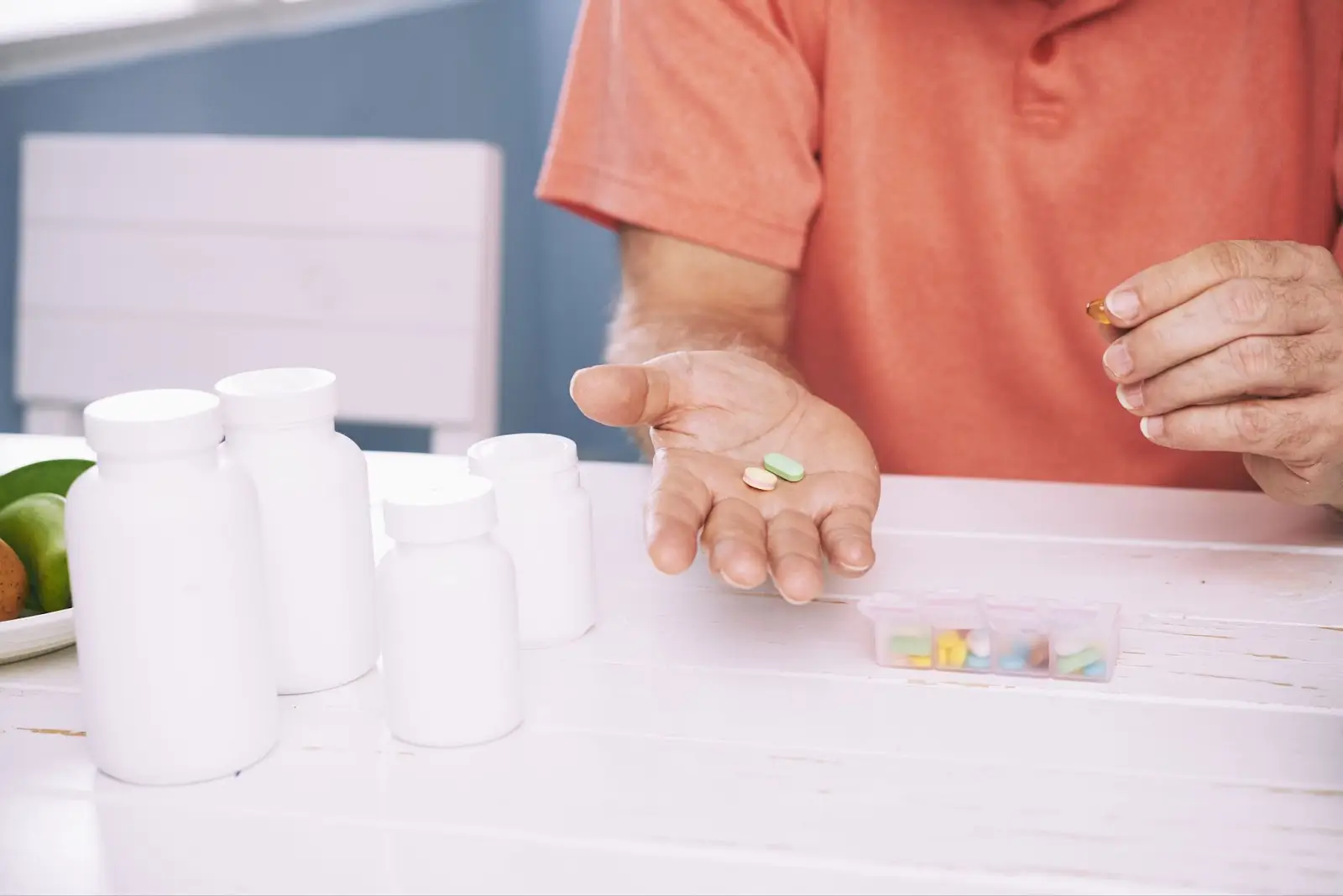Only for Licensed Professionals
Only for Licensed Professionals
.webp)
What to Avoid While On Remicade
David Fuller
Last Updated On: July 8, 2025
A recent study in the UK revealed that individuals with autoimmune conditions—where the body’s immune system mistakenly attacks healthy tissues—are nearly twice as likely to experience persistent mood disorders, largely due to chronic inflammation. This highlights the broader impacts of autoimmune diseases beyond physical health.
Remicade (infliximab), a biologic therapy commonly used to treat conditions like rheumatoid arthritis, Crohn’s disease, and plaque psoriasis, helps manage these conditions by targeting tumor necrosis factor alpha (TNF-α), a key driver of inflammation. Administered via intravenous infusion, Remicade effectively reduces inflammation and alleviates symptoms.
However, to maximize the benefits and minimize risks, it’s essential to be mindful of activities, supplements, and medical procedures that could interfere with Remicade treatment. In this article, we’ll explore key precautions and provide practical tips to help you stay safe, ensuring you get the best possible outcomes from your treatment.
Key Takeaways
- Pre-treatment screening is essential before starting Remicade (infliximab) therapy, which includes tests for tuberculosis, hepatitis B, and liver function, as well as updating vaccinations to minimize the risk of complications.
- Remicade interacts with several medications, such as other immunosuppressants, live vaccines, and certain antibiotics, so it’s crucial to avoid these combinations to prevent adverse effects.
- Patients should be mindful of their health behaviors, including avoiding crowded places and raw or undercooked foods and ensuring proper hygiene to minimize the risk of infections, as immunocompromised individuals are more vulnerable.
- Patients should consult their healthcare provider before undergoing any medical or aesthetic procedures to ensure they take the necessary adjustments or precautions.
- Lifestyle habits, such as maintaining a balanced diet, staying hydrated, and avoiding alcohol, can support overall health while on Remicade and prevent unnecessary strain on the liver.
- Regular check-ups and lab tests should be part of the treatment routine to monitor for potential complications, especially related to liver health or low blood counts.
- Logging symptoms such as fatigue, fever, or joint pain and reporting them promptly ensures the early management of potential side effects.
- Proactive patient education and clear communication with healthcare providers help manage treatment effectively, enabling patients to take control of their health journey with Remicade.
- Consult your doctor before discontinuing or switching medications or if you experience severe side effects. Discontinuing treatment without proper guidance can lead to complications.
About: Operating since 2016, Med Supply Solutions is known for being one of the industry’s top and trusted suppliers of cosmetic and viscosupplementation products. If you’re interested in purchasing Remicade online, please contact our sales department for more information.

Pre-Treatment Screening Essentials for Remicade Safety
Before beginning Remicade treatment, patients must undergo a thorough screening process to identify any potential risks that could lead to serious complications once therapy begins. Clinicians aim to ensure the patient does not have a compromised immune system or is at risk of complications from existing conditions or infections.
Tests commonly include tuberculosis screening, either via a skin test or chest X-ray, hepatitis B screening, and basic blood work to check liver function and infection markers. Any positive findings may necessitate a delay or modification of the treatment plan to ensure safety. Healthcare providers review vaccinations before starting therapy, since live vaccines cannot be administered during Remicade treatment.
It’s essential to update immunizations before beginning Remicade therapy to minimize the risk of infection. Patients must discuss their complete medical history with their healthcare provider to ensure that no potential health concerns are overlooked.
Medications That Can Interact with Remicade

One of the most critical aspects of managing infliximab therapy (the generic name of Remicade) is avoiding interactions with other medications that can either interfere with its effects or increase the risk of side effects, such as infections or liver damage.
Medications to Avoid
- Other immunosuppressants, such as azathioprine or methotrexate, may increase the risk of infection when used in combination with Remicade.
- Live vaccines, such as MMR, yellow fever, or varicella, may cause a weakened immune response during treatment.
- TNF blockers or other biologics may amplify immune suppression and side effects, raising concerns about potential complications.
- Certain antibiotics or antifungals that affect liver enzymes may alter the metabolism of Remicade, increasing the risk of liver toxicity or reducing its efficacy.
Always inform your healthcare provider about all medications, supplements, or herbal products you are taking, including over-the-counter pain relievers. Discuss all products, even those that seem harmless, to avoid unintended interactions.
Health Behaviors and Environmental Exposures to Minimize

Since Remicade weakens immune defenses, extra precautions must be taken to avoid infections. Understanding what to avoid while on Remicade can help reduce the risk of complications and improve the success of the treatment.
Health Behaviors and Environments to Avoid
- Crowded, enclosed spaces during flu or COVID-19 outbreaks increase the risk of infection. Avoid high-risk settings to reduce exposure to germs.
- Raw or undercooked foods, such as sushi or soft cheeses, may contain bacteria that are particularly hazardous to individuals with weakened immune systems.
- Poor hygiene habits, such as failing to wash hands or improperly caring for wounds, can lead to preventable infections.
- Contact with individuals who are sick, especially those with respiratory infections or skin rashes, should be minimized to protect against potential exposure.
Regular handwashing, mask-wearing in high-risk settings, and avoiding unnecessary exposure to germs are simple but effective practices while on Remicade. Hydration and proper rest also contribute to maintaining a strong immune system.
Aesthetic or Medical Procedures While Using Remicade
Since Remicade alters immune function and can affect the body’s ability to heal, extra caution should be exercised for any medical or cosmetic procedures that involve breaking the skin.
Elective Surgeries and Procedures
- Schedule elective surgeries during periods of disease remission, when inflammation is minimal and the immune system is more stable. Pause or adjust Remicade therapy if needed to reduce infection risk and optimize surgical outcomes.
- Dental procedures, such as extractions or deep cleanings, may require prophylactic antibiotics to prevent infections from entering the bloodstream, which could lead to a systemic infection in immunosuppressed patients.
- Avoid tattoos or piercings while on Remicade, due to the heightened risk of bacterial infection and delayed wound healing. Even with proper aftercare, the body’s response to skin trauma may be compromised.
- Discuss injectable aesthetic treatments, such as dermal fillers or Botox, with your healthcare provider in advance to ensure procedures are tailored to your needs and risks are minimized.
Guiding Patients on Lifestyle and Self-Monitoring with Remicade
Adopting long-term habits that support safety and well-being is crucial for patients undergoing Remicade therapy, particularly given the ongoing nature of the treatment.
Helpful Practices for Patients
- Regular check-ups and lab tests are necessary to monitor liver function or low blood counts. These can be side effects of Remicade.
- Recording symptoms, such as fatigue, joint pain, or fever, can aid in the early detection of adverse effects.
- Maintaining a balanced diet helps support immune and digestive health.
- Avoiding alcohol is crucial, as it can stress the liver, which is already working to metabolize Remicade.
- Staying hydrated and well-rested contributes to quicker recovery and overall well-being.
Patient education and consistent communication with healthcare providers are vital to successfully managing Remicade treatment. The more informed a patient is, the better equipped they are to take proactive steps in managing their health.
Conclusion
Knowing what to avoid while on Remicade is essential for ensuring a safe and effective treatment journey. Whether it involves drug interactions, infection risks, or medical procedures, understanding how infliximab affects the body helps patients take the necessary precautions to optimize their treatment.
By working closely with healthcare providers and maintaining healthy habits, patients can continue to benefit from Remicade therapy without unnecessary complications.
FAQs
1. Can I get vaccinated while on Remicade?
You should avoid live vaccines during treatment. Inactivated vaccines, such as the flu shot, are generally safe. Always consult your doctor before receiving any vaccine.
2. Is it safe to drink alcohol on Remicade?
Moderate alcohol use may be acceptable, but it can stress the liver. It’s best to limit or avoid alcohol, especially if you’re also taking other medications processed by the liver.
3. Can I exercise at the gym while taking Remicade?
Engage in light to moderate exercise, but avoid crowded gyms during flu season to minimize the risk of infection. Always stay hydrated and listen to your body; if fatigue or joint pain increases, take note of it.
4. Should I stop Remicade before surgery?
Depending on the procedure, your doctor may recommend timing your infusion to minimize immune suppression during the recovery period. Always inform your surgeon and rheumatologist in advance.
References
Autoimmune conditions may increase risk of mental health issues: Study. Mid-day. Published June 26, 2025. https://www.mid-day.com/lifestyle/health-and-fitness/article/autoimmune-conditions-may-increase-risk-of-mental-health-issues-study-23578963.
Emer JJ, Frankel A, Zeichner JA. A practical approach to monitoring patients on biological agents for the treatment of psoriasis. J Clin Aesthet Dermatol. 2010;3(8):20-26.
Remicade: Uses, Dosage & Side Effects. Drugs.com. https://www.drugs.com/remicade.html
Products
Cart
Log In
Newsletter
Subscribe for exclusive offers and updates on new arrivals
Share feedback at:
Working Hours
MON - SUN 9AM to 6PM EST
The Most Popular Brands
Med Supply Solutions
Support
Secure checkout is guaranteed with full adherence to PCI DSS payment standards.
Products listed here are guaranteed authentic and manufacturer-sourced.
Pay easily with trusted providers


*Google and Apple Pay are currently only available via a direct link provided by your account manager.
Copyright 2026. Med Supply Solutions